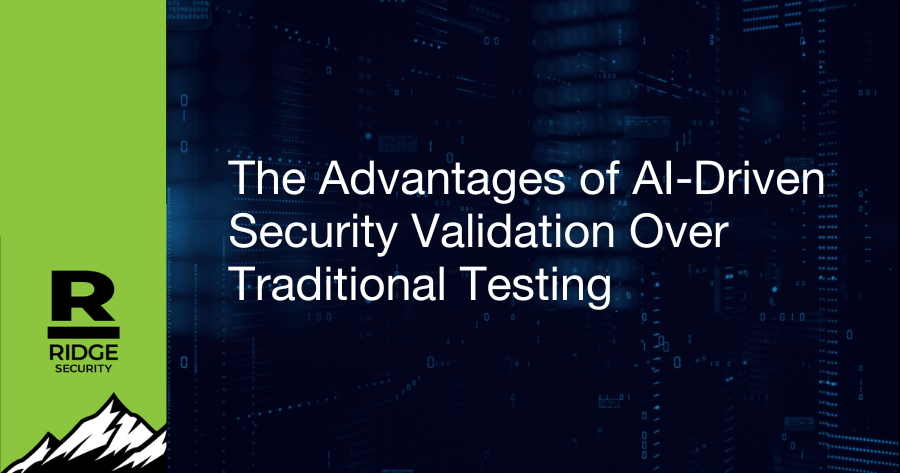While traditional testing methods have long been the standard for assessing security posture, security validation represents a paradigm shift in modern cybersecurity. In this blog, we’ll explore the advantages of AI-driven security validation over traditional testing methods and why it’s becoming increasingly indispensable in the fight against cyber threats.
Continuous Monitoring and Real-Time Assessment
Traditional testing often relies on simulated attack scenarios based on known vulnerabilities and attack vectors. While these simulations are informative, they may not perfectly replicate the tactics and techniques used by real-world attackers. This is where automated penetration testing and AI-driven security validation excel. They precisely mimic threat actors’ tactics, adapting dynamically to evolving attack surfaces, and strategically prioritize vulnerabilities, focusing on critical weak points. This precision provides a more accurate assessment of an organization’s readiness to defend against real-world threats.
Traditional testing methods often prioritize vulnerabilities based solely on their technical severity without considering the potential business impact or likelihood of exploitation. AI-driven security validation takes a risk-based approach, considering factors such as the criticality of assets, regulatory compliance requirements, and the possibility of exploitation. By aligning security efforts with business objectives and risk tolerance levels, organizations can prioritize remediation efforts more effectively, ensuring that resources are allocated where they are needed most.
AI-Driven Validation Enhances Security
Traditional testing methods often require manual intervention and can be time-consuming and resource-intensive, particularly in large and complex environments. AI-driven security validation leverages automation and algorithms to streamline the testing process and scale to meet today’s security requirements. By automating repetitive tasks and leveraging artificial intelligence, security validation enables organizations to assess their security posture more efficiently and comprehensively without overburdening security teams.
Further, traditional testing methods may struggle to provide comprehensive coverage in today’s hybrid IT environments of on-premises, multi-cloud, and third-party applications. In contrast, AI-driven security validation spans all digital footprint components, regardless of location or deployment model. By encompassing traditional and cloud-based environments, AI-driven security validation ensures that no stone is left unturned when assessing security posture.
Compliance with industry regulations and standards is vital in an era of increasing regulatory scrutiny and data privacy concerns. Traditional testing methods may fall short of providing the level of assurance required to demonstrate compliance with regulatory requirements. AI-driven security validation offers a more robust and defensible approach to compliance, providing evidence-based assurance to satisfy regulatory auditors and stakeholders.
Risk-Based Prioritization in AI-Driven Security Validation
Risk-based prioritization is a strategic approach that allows organizations to allocate their security resources more effectively. Let’s break down the key components.
Leveraging AI – AI algorithms analyze vast amounts of data, identify patterns, and make informed decisions. By incorporating AI, security validation processes are more efficient and precise.
Not All Assets are Equal – Some assets are more critical to operations, revenue, or reputation. Risk-based prioritization considers the importance of each asset. For instance, protecting customer databases or financial systems might take precedence over less critical assets.
Compliance with industry regulations and standards – Risk assessment evaluates how well an asset aligns with these requirements. Non-compliance could lead to legal penalties or reputational damage.
Vulnerability Assessment – Not all vulnerabilities pose the same risk. Risk-based prioritization focuses on vulnerabilities that are more likely to be targeted.
Alignment With Business Goals – Risk-based prioritization ensures that security investments directly contribute to achieving business objectives. For example, if a company’s primary goal is to protect customer data, security resources would be allocated accordingly.
Optimize Resource Allocation – Scarce resources, such as budget, personnel, and time, are directed where they matter most. Instead of spreading resources thinly across all vulnerabilities, risk-based prioritization targets investments.
RidgeBot AI-Powered Security Validation Platform
RidgeBot, an AI-powered security validation platform, equips organizations to strengthen their defenses, reduce risks, and effectively protect their digital assets. By seamlessly integrating security into DevOps pipelines, RidgeBot accelerates threat detection and response, ensuring the highest standards of cybersecurity resilience in today’s ever-evolving threat landscape.
Characteristics of RidgeBot’s AI-Powered Security Validation
- Continuous Learning – RidgeBot constantly learns from the information it discovers, allowing it to adapt and refine its strategies over time.
- Strategic Prioritization – The RidgeBot smart decision engine focuses on high-impact risks, seeking vulnerabilities like RCE that yield the most significant results.
- Lateral Movement Focus – The RidgeBot smart decision engine targets vulnerabilities that facilitate lateral movement within a network, which can launch attacks on other assets accessible from that point.
RidgeBot streamlines the process of identifying and reporting vulnerabilities and exposures. It automatically validates these issues, offers remediation recommendations, and ensures compliance. Organizations can then assess risk severity in context, providing a more accurate understanding of their digital landscape.
Click here for our eBook “Ridge Security’s AI-Driven Security Validation Gives Unparalleled Power to Cyber Defenders.”
